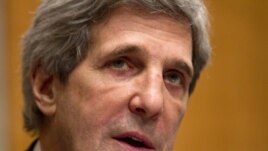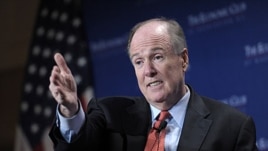Picking the Next US Secretary of State
STATE DEPARTMENT — U.S. Secretary of
State Hillary Clinton says she will step down from her job as President
Barack Obama prepares for his second term.
Secretary Clinton announced her decision earlier this year, telling State Department employees that she needs a break.
"I will certainly stay on until the president nominates someone and that transition can occur, but I think after 20 years of being on the high-wire of American politics and all of the challenges that come with that, it would be probably a good idea to just find out how tired I am," said Clinton.
Since the president's re-election, State Department spokeswoman Victoria Nuland says that is still the plan.
"You’ve heard her say many times that she intends to see through a transition of a successor and then she will go back to private life and enjoy some rest and think and write and all those things," said Nuland.
So who will President Obama choose to replace her?
Massachusetts Senator John Kerry is a leading contender.
As chairman of the Senate Committee on Foreign Relations, he is active in U.S. policy abroad, especially in Pakistan and Afghanistan. As a former presidential candidate, he has some of the celebrity that Clinton uses to advance U.S. goals.
He is the man who President Obama chose to help practice debating Republican candidate Mitt Romney, and the Obama campaign used Kerry in an anti-Romney video.
"Romney just says things that are not true or irresponsible and is willing, for politically expedient reasons, to put at risk our foreign policy," said Kerry.
Kerry's obstacle may be his Senate seat. Any president who chooses any senator for a Cabinet post considers whether the ruling party can keep that seat in the legislature. Especially in a chamber with such a small majority as the current Senate.
Republican Massachusetts Senator Scott Brown lost a tightly-contested race for re-election this week. That close-fought campaign puts Brown atop candidates to win the commonwealth's other Senate seat if Kerry leaves for the State Department.
U.N. Ambassador Susan Rice is another leading contender to replace Clinton.
Much of the diplomacy in New York mirrors what is happening on the world stage, so being U.N. ambassador is good training for secretary of state. Madeleine Albright made the move.
But nominating Rice may raise criticism from Senate Republicans over the Obama administration's handling of the September terrorist attack on the U.S. mission in the Libyan city of Benghazi that killed four Americans, including Ambassador Chris Stevens.
There is no evidence linking Rice to any of the decisions about security in Benghazi. But Rice was the face of the Obama administration on Sunday talk shows following the attack and she repeated the claim that the violence grew from demonstrations against an Internet video defaming Islam's Prophet Muhammad. That version of events has since been retracted.
"There are still many unanswered questions surrounding the terrorist attack by militants, and I think that might be the greatest liability," said Malou Innocent, a foreign policy analyst at Washington's Cato Institute. "But that said, she does remain a strong contender for the position and we will see sort of what might happen with her Senate confirmation."
Another leading candidate to replace Clinton is Tom Donilon, the current U.S. National Security Advisor. It is a job at the center of the president's foreign-policy-making apparatus held by Henry Kissinger, Colin Powell, and Condoleezza Rice before they were secretaries of state.
Donilon is a veteran of the Bill Clinton administration where he worked on NATO expansion and the 1995 Dayton Accords that ended fighting in the former Yugoslavia.
"He was deeply involved in President Obama's counter-terrorism policies," said CATO analyst Malou Innocent. "He also does have the president's ear in many respects. I think what he lacks, however, is the star power that Secretary Clinton had. He does not have the eminence internationally that someone like Clinton would have and something that you would expect in terms of relations with other nations."
There is no timetable for Secretary Clinton stepping down. But President Obama could nominate a replacement before the end of the year in hopes of having that person in place when he takes his second oath of office in January.
Secretary Clinton announced her decision earlier this year, telling State Department employees that she needs a break.
"I will certainly stay on until the president nominates someone and that transition can occur, but I think after 20 years of being on the high-wire of American politics and all of the challenges that come with that, it would be probably a good idea to just find out how tired I am," said Clinton.
Since the president's re-election, State Department spokeswoman Victoria Nuland says that is still the plan.
"You’ve heard her say many times that she intends to see through a transition of a successor and then she will go back to private life and enjoy some rest and think and write and all those things," said Nuland.
So who will President Obama choose to replace her?
Massachusetts Senator John Kerry is a leading contender.
As chairman of the Senate Committee on Foreign Relations, he is active in U.S. policy abroad, especially in Pakistan and Afghanistan. As a former presidential candidate, he has some of the celebrity that Clinton uses to advance U.S. goals.
He is the man who President Obama chose to help practice debating Republican candidate Mitt Romney, and the Obama campaign used Kerry in an anti-Romney video.
"Romney just says things that are not true or irresponsible and is willing, for politically expedient reasons, to put at risk our foreign policy," said Kerry.
Kerry's obstacle may be his Senate seat. Any president who chooses any senator for a Cabinet post considers whether the ruling party can keep that seat in the legislature. Especially in a chamber with such a small majority as the current Senate.
Republican Massachusetts Senator Scott Brown lost a tightly-contested race for re-election this week. That close-fought campaign puts Brown atop candidates to win the commonwealth's other Senate seat if Kerry leaves for the State Department.
U.N. Ambassador Susan Rice is another leading contender to replace Clinton.
Much of the diplomacy in New York mirrors what is happening on the world stage, so being U.N. ambassador is good training for secretary of state. Madeleine Albright made the move.
But nominating Rice may raise criticism from Senate Republicans over the Obama administration's handling of the September terrorist attack on the U.S. mission in the Libyan city of Benghazi that killed four Americans, including Ambassador Chris Stevens.
There is no evidence linking Rice to any of the decisions about security in Benghazi. But Rice was the face of the Obama administration on Sunday talk shows following the attack and she repeated the claim that the violence grew from demonstrations against an Internet video defaming Islam's Prophet Muhammad. That version of events has since been retracted.
"There are still many unanswered questions surrounding the terrorist attack by militants, and I think that might be the greatest liability," said Malou Innocent, a foreign policy analyst at Washington's Cato Institute. "But that said, she does remain a strong contender for the position and we will see sort of what might happen with her Senate confirmation."
Another leading candidate to replace Clinton is Tom Donilon, the current U.S. National Security Advisor. It is a job at the center of the president's foreign-policy-making apparatus held by Henry Kissinger, Colin Powell, and Condoleezza Rice before they were secretaries of state.
Donilon is a veteran of the Bill Clinton administration where he worked on NATO expansion and the 1995 Dayton Accords that ended fighting in the former Yugoslavia.
"He was deeply involved in President Obama's counter-terrorism policies," said CATO analyst Malou Innocent. "He also does have the president's ear in many respects. I think what he lacks, however, is the star power that Secretary Clinton had. He does not have the eminence internationally that someone like Clinton would have and something that you would expect in terms of relations with other nations."
There is no timetable for Secretary Clinton stepping down. But President Obama could nominate a replacement before the end of the year in hopes of having that person in place when he takes his second oath of office in January.





ไม่มีความคิดเห็น:
แสดงความคิดเห็น